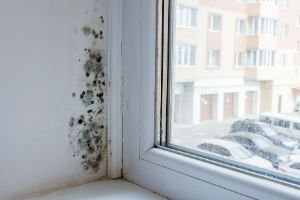Obtaining the optimal amount of moisture in your home’s air can be tricky. If the air is too dry, it can create uncomfortable living conditions and actually pull moisture from your home’s structure and walls, causing them to shift. Not good. However, too much moisture can also cause numerous issues as well. As the humid summer season rapidly approaches, check out this list of some of the top consequences of too much humidity in the home so that you know exactly what you’re up against.
Mold and Mildew Growth
Mold and mildew thrive in moist environments. As such, if the air in your home becomes too humid, it could serve as an ideal breeding ground for all sorts of unfortunate growths. In addition to harming your home by weakening its structure, mold can also have an extremely negative impact on one’s health. As mold grows, the spores that it releases can have numerous adverse health effects such as eye, nose, throat, and skin irritation, as well as worsening asthma symptoms and an increased risk of respiratory illness.
Because mold is extremely hard to get rid of once it starts to spread throughout a home, it’s important to take measures to prevent it from occurring in the first place. One of the best ways to keep a healthy level of moisture in your home is by optimizing your air conditioner to remove more humidity. Doing so can often be as simple as just changing a few settings.
Health Concerns
Perhaps the most significant consequence of too much humidity in the home is an increased risk of numerous health concerns. For one, bacteria and viruses thrive in humidity levels over 60 percent and stay airborne for longer, which means those living in humid homes are at an increased risk of illness—particularly respiratory infections.
In addition, humid environments also increase the concentration of chemical contaminants in the air. Nearly all homes experience some degree of off-gassing from carpeting, wood products, and other sources. When the air is humid, the concentration of such chemicals increases as the fumes react with the water vapor. As a result, people can experience numerous physical ailments such as eye, nose, and throat irritation and an increased risk of respiratory diseases.
Property Damage
In addition to fostering an environment for harmful mold and mildew to thrive, excess humidity can damage your home in several other ways. One of which is by increasing condensation on windows. Overtime, such condensation can cause wooden panes to rot or it may damage the plaster on the wall surrounding the window. High moisture levels can also damage the walls and ceilings throughout your house by causing wet spots and stains to form.
5 Things You Can Do To Improve The Air Quality of Your Home


